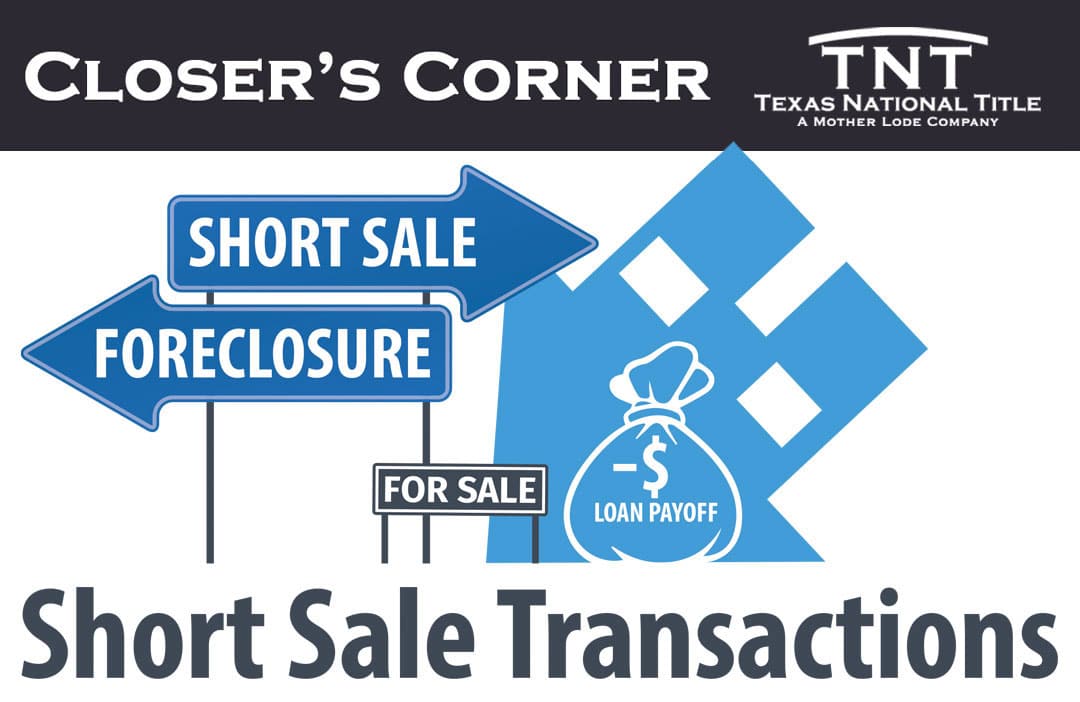
With changes in the market we are starting to see short sale transactions come back around so this article is intended to share some important details about the short sale transaction.
What is a short sale?
A short sale occurs when the payoff loan balance exceeds the possible sales price of a home. If the owner is going to be upside down on the house in the sale they can approach the lender to request that the lender allow the sale of the home for less than they owe on the mortgage. The lender of the original mortgage agrees to lower the payoff amount, receive all of the proceeds of the sale, allow the sale to occur and agree to release the lien on the property.
Why would a lender agree to a short sale?
Obviously the short sale transaction is less than ideal for the lender, but if the owner is in financial distress, where foreclosure may be possible, the short sale can be a preferable alternative to foreclosure. When a lender forecloses on a loan there are several costs that are unknown to them at the time of foreclosure. These costs can include the cost of the actual foreclosure, the carrying costs of holding the property, repair costs and costs of sale when they re-sell that property.
The short sale is a way for a homeowner and lender to get out of a difficult financial situation by taking a loss that is a known amount instead of the unknown risk of foreclosure.
How does a short sale work?
If a transaction is going to involve a short sale much of the application and negotiation must be done by the seller with their payoff lender. The process starts with the seller making a short sale application to their payoff lender. Each lender will have slightly different requirements for their application package but in general they will want to see lots of documentation including things like:
A few potential short sale pitfalls:
Keep in mind that getting a short sale approved is a negotiation with the lender and for the most part the lender is the decision maker in the process. This does mean that they can control certain things in the transaction such as the permissible amount of realtor commission to be paid and who pays certain closing fees. A lender may also require that the seller bring some funds to closing to mitigate the lender’s loss on the transaction. They may often prohibit a flip transaction and they can rule out any sales to related parties. Also, if there is a second lien on the property the first lien lender may not allow any funds to be paid to the second lien. This means that a seller with a first and second lien has to do separate short sale negotiations with each of their lenders and both lenders have to agree before the deal can close.
These negotiations can take a lot of time to get approved which makes it very important that realtors writing contracts be sure to include the Short Sale Addendum www.trec.texas.gov/sites/default/files/pdf-forms/45-2_1.pdf with the contract negotiations. It is also very important to manage the expectations of buyer and seller as to the timing of closing. Use of the addendum provides that if the short sale is not approved by the date included in Paragraph D of the addendum the addendum gives the buyer the right to terminate the contract and receive their earnest money back.
Two other things that the seller needs to take into account is what happens to the remaining balance on the loan. Some short sale negotiations will result in the remaining balance being written off by the lender but others will want to obtain a judgment against the seller for that remaining balance (often called a “deficiency judgment”). A deficiency judgment allows the lender to pursue collection of that judgment at a later time against the seller. Lenders may also negatively report the short sale transaction to the credit bureaus which can negatively affect a seller’s credit score. This of course affects their borrowing potential moving forward post-closing.
What should buyers know about a short sale?
Buyers (and their agents) should make sure they are using the Short Sale Addendum previously discussed. Buyers should also look out for any limitations on re-sale of the property that the lender requires to approve the sale. It is possible that a short sale lender will approve the sale but make it conditional upon the buyer not re-selling the property for a specific amount of time. If that requirement is made that exception will be included in the Owner’s Title Policy that is issued to the buyer.
Here’s the good news – our escrow teams at Texas National Title are experts at processing short sale transactions! Working with a knowledgeable title company is the key to success! The best thing a realtor can do is select a closing team at Texas National Title because we are the experts that you need! Give me a call if you’d like to discuss these types of transactions and more.